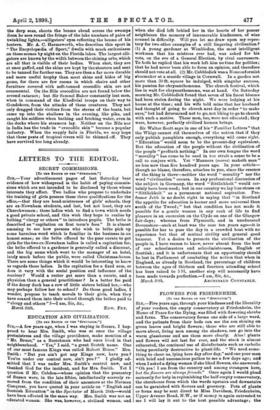EDUCATION AND CIVILISATION.
[TO 7'HE EDITOR OE THE "SPECI'ATOIC.']
SIR,—A few years ago, when I was staying in Sussex, I hap- pened to hear Mrs. Smith, who was at once the village postmistress and the village providence, make mention of a
Mr. Bruce," as a Scotchman who had once lived in that neighbourhood. "Yes," I said, "a great Scotch name. One of our most famous Kings was called Robert Bruce." Mrs. Smith : "But you ain't got any Kings now, have you ? You're under our control now, ain't you ?" I gladly ad- mitted that I was under Mrs. Smith's control now, and thanked God for the incident, and for Mrs. Smith. Yet I question if Mr. Cobden—whose opinion that the peasantry of Sussex were, in the late fifties, intellectually scarcely re- moved from the condition of their ancestors at the Norman Conquest, you have quoted in your article on "English and Scottish Education" in the Spectator of March 26th—would have been affected in the same way. Mrs. Smith was not an educated woman. She was, however, a civilised woman, and when she died left behind her in the hearts of her poorer neighbours the memory of innumerable kindnesses, of wise counsel in difficulty. Will you let me draw upon my reper- tory for two other examples of a still lingering civilisation ? (1) A young gardener at Wimbledon, the most intelligent workman that his mistress ever had, was asked for his vote, on the eve of a General Election, by rival canvassers. To both he replied that his work left him no time for politics ; that he had never been able to form an opinion, and therefore should not vote at all. (2) Mr. Cobbledick was a Nonconformist shoemaker at a seaside village in Cornwall. In a garden not more than 30 ft. square he indulged, with singular success, his passion for chrysanthemums. The church festival, which lies in wait for chrysanthemums, was at hand. On Saturday morning Mr. Cobbledick found that seven of his finest blooms had been stolen during the night. We were lodging at his house at the time ; and his wife told mine that her husband had thought of going to church next day in order "to make sure," but had determined not to go, not liking to go to church with such a motive. These men, too, were not educated; they were, however, perfectly civilised human beings.
Sir Walter Scott says in one of his "Familiar Letters" that the Whigs cannot rid themselves of the notion that if they only publish pamphlets enough, everything will come right. "Education" would seem to be the present-day equivalent. But the education of the people without the civilisation of the people " profiteth nothing." In our own tongue the word "morality" has come to be used in too strait a sense to be a call to conjure with. Yet "Manners (mores) maketh man" no less now than five hundred years ago. In your article— though no blame, therefore, attaches to you, since the essence of the thing is there—neither the word " morality " nor the word " civilisation " occurs. In any professional discussion of the subject in Germany, the word " Sittlichkeit " would cer- tainly have been used; but in our country we lay less stress on " Sittlichkeit as a permanent national aspiration. Pro- fessor Jebb is no doubt right in saying that "in Scotland the appetite for education is keener and more universal than south of the Tweed ; " but that condition has not made it possible for a gentle woman in any rank of life to find pleasure in an excursion on the Clyde on one of the Glasgow fair-days ; whereas from Plymouth, and in uneducated Devonshire—such at least was the case ten years ago—it is possible for her to pass the day in a crowded boat with no experience but that of mutual civility and general good humour. Yet a desire to promote the civilisation of the people is, I have reason to know, never absent from the best of our schoolmasters and schoolmistresses, English or Scottish ; and it is unfortunate that an opportunity should be lost in Parliament of combating the notion that when in England, as already in Scotland, the percentage of children between the ages of thirteen and fourteen attending school has been raised to 5 91, another step will necessarily have been made towards perfection.—I am, Sir, &c.,


































 Previous page
Previous page